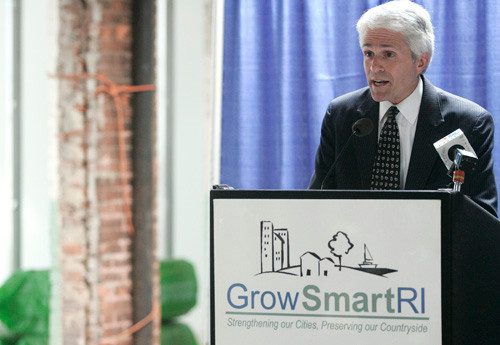
Scott Wolf, head of Grow Smart Rhode Island, met with President Barack Obama and the White House staff Nov. 1, part of a 150-member delegation from Transportation for America, a national alliance of advocates promoting targeted investments in road and bridge repair and enhanced public transit. Wolf also had a chance to hear from Vice President Joe Biden and meet with federal transportation officials to discuss funding for transportation and infrastructure investments.
PBN: Let’s start by discussing your recent visit to the White House and your meeting with President Obama. What did you accomplish?
WOLF: It was a great opportunity to hear directly from the president about his efforts to strengthen the economy and invest in needed infrastructure improvements. He was passionate and inspiring and also displayed a great sense of humor. I think he’s a real resilient guy dealing with huge challenges.
As far as what the trip accomplished, there are several things that were positive. One is that it enabled me to gain some additional insight into the White House strategy for securing additional funding for transportation and infrastructure investments. I had a chance to meet with some of the president’s staff people. … One of the things the president said that really struck me is that funding for infrastructure never used to be a partisan issue and used to have bipartisan support. …
What was also very helpful about this trip was that it enabled me to make good contacts with several people on the White House staff. which I think can be useful as we at Grow Smart seek to track and influence more federal legislation on issues like transportation, housing and urban revitalizations. Those are the issues we’re prioritizing in Rhode Island.
PBN: The General Assembly enacted parts of the legislation proposed by the 40-member Coalition for Transportation Choices, co-chaired by Grow Smart. Can you tell us about the parts enacted?
PBN: Where would the funds come from?
WOLF: From an increase in [motor vehicle] registration and license fees, so they would be user fees as opposed to general revenue [taxes]. Some of those new funds would be dedicated to replacing future borrowing so that we do not get further in debt than we need on our transportation programs. It is a fairly modest amount of new funding. [Surcharges on biennial registrations would add $30 yearly, on one-year registrations $15 and on licenses, $30 every five years, all phased in starting in fiscal year 2014, according to the legislation.]
PBN: And what was not enacted?
WOLF: What was left out of the legislation is any allocation of new funds to public transportation, to R.I. Public Transit Authority, and that is a big disappointment for us.
What we have been and will continue to propose is a fund that has its resources distributed to three different targets: 50 percent would go to the R.I. Department of Transportation for road and bridge repair; 35 percent to RIPTA for its operations; and 15 percent for localities to help maintain their own municipal transportation systems. We’re going to revisit our proposal and push for it again in the 2012 session.
PBN: Were you looking for a specific amount of money for RIPTA?
WOLF: We were asking the legislature to consider a number of different ways to raise additional revenue … But we did not set forth a particular amount of money.
That commission [in 2008] estimated that we needed twice as much money annually for the next 10 years as we currently spend on transportation to get all of our roads and bridges into a condition of good repair. It identified a number of new potential funding sources, including tolls.
We are pleased that the Chafee administration is looking seriously at the possibility of instituting a toll at the Rhode Island/Connecticut line because we think there are a lot of non-Rhode Islanders using our transportation system who are not paying for it. Whereas when we go travel to other states, in many of the other states in New England, we are subject to tolls.
We think it’s only fair that this happen and it is important to have a new revenue source if we’re going to be economically competitive. We are convinced that you can’t have a first-class economy with a second-class infrastructure. … When we talk about transportation infrastructure, we don’t mean just roads and bridges. We mean public transit, airports, ports, passenger rail, the whole comprehensive transportation system.
PBN: Why is Grow Smart, an organization intended to control growth and ill-planned development, so involved in transportation issues?
WOLF: Transportation is a very important part of our mission. We think that a lot of the urban decay and suburban sprawl that we’ve experienced in Rhode Island results from poor transportation planning, especially the lack of alternatives to single-occupancy auto travel. … Because we’re devoted to more walkable and vibrant communities, we’re convinced that expanded transportation choices are critical for achieving those goals. •
INTERVIEW
Scott Wolf
POSITION: Executive director, Grow Smart Rhode Island
BACKGROUND: Previous to becoming Grow Smart director 12 years ago, he served as executive director of the ’98 Project, a national education and congressional accountability initiative sponsored by progressive organizations. He also was director of the Governor’s Office of Housing, Energy and Intergovernmental Regulations under the late Bruce Sundlun, when he was governor. He has been president of the consulting firm Scott Wolf and Associates, director of political research for the Democratic National Committee and a public opinion analyst for Peter D. Hart Associates. He unsuccessfully ran for Congress in 1988 and 1990.
EDUCATION: Bachelor’s degree in political science, Brown University; 1975
FIRST JOB: Cutting shavings from jewelry castings, Trifari Jewelry, East Providence, at the age of 16
RESIDENCE: Providence
AGE: 58











